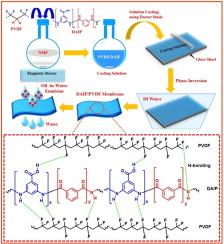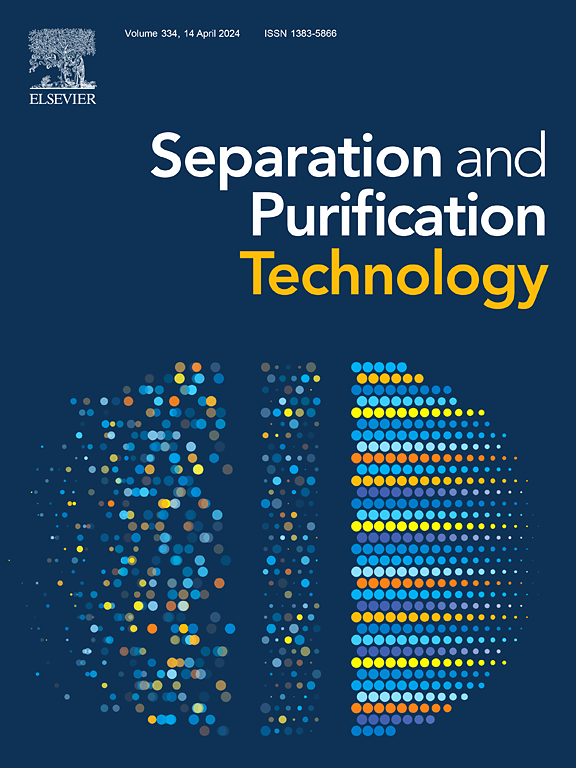Condensation polymerization of 3,5-diaminobenzoic acid and isophthaloyl chloride yielding hydrophilic polyamide and its decoration in polyvinylidene difluoride membranes for the efficient separation of stable oil/water emulsions
IF 8.1
1区 工程技术
Q1 ENGINEERING, CHEMICAL
引用次数: 0
Abstract
Enormous quantities of emulsified oily wastewater are released from domestic households and industries and offer a huge challenge for treating such a complex stream. Where this oily emulsified feed is a challenge, it is also an opportunity provided an efficient treatment method is applied. Hence, the current study was designed to fabricate hydrophilic mixed-matrix membranes (MMMs) by incorporating a hydrophilic polyamide, DAIP, as a polymeric filler in the matrix of the polyvinylidene difluoride (PVDF) membrane. The obtained membranes were applied for separating surfactant-stabilized oil/water (O/W) emulsion. First, the DAIP polymer was synthesized via condensation polymerization between 3,5-diaminobenzoic acid (DABA) and isophthaloyl chloride (IPC). Then the obtained DAIP polymer was thoroughly investigated to establish its structure and subsequently decorated in the PVDF matrix in different increasing concentrations (0–3 and 5%). Among the different fabricated membranes, M3 (PVDF-8%, PVP-3%, and DAIP-3% wt/wt of the solution) possessed the desired salient features especially the increased surface features such as surface energy, hydrophilicity, charge, and surface roughness. Hence, the M3 membrane showed excellent separation performance during O/W emulsion separation experiments regarding pure water permeance with a value of 2600 L m−2 h−1 bar−1 and separation efficiency of >96% for oil-in-water emulsion. In contrast, the control M0 (PVDF-8%, PVP-3%) membrane showed inferior performance with a permeance of 1430 L m−2 h−1 bar−1 and a separation efficiency of 79% based on total organic carbon (TOC) analysis. Long-term fouling studies revealed that DAIP-decorated membranes exhibited reversible fouling behavior and higher fouling resistance than pristine PVDF membranes. During stability tests, M0 (PVDF-8%, PVP-3%) facilitated the adsorptive removal of total organic carbon (TOC). This study provides valuable insights into designing and developing advanced membranes for efficient O/W separation by exploiting simple and scalable polymerization approaches.


3,5-二氨基苯甲酸与异苯甲酰氯缩聚制得亲水性聚酰胺及其在聚偏二氟乙烯膜上的修饰,用于稳定油水乳液的高效分离
大量乳化含油废水从家庭和工业中排放出来,这对处理如此复杂的废水提出了巨大的挑战。如果采用有效的处理方法,这种油性乳化饲料是一个挑战,也是一个机会。因此,本研究旨在通过在聚偏氟乙烯(PVDF)膜的基质中加入亲水性聚酰胺(DAIP)作为聚合物填料来制备亲水性混合基质膜(MMMs)。将所得膜用于分离表面活性剂稳定的油水(O/W)乳液。首先,以3,5-二氨基苯甲酸(DABA)和异苯二甲酰氯(IPC)为原料,通过缩聚反应合成了DAIP聚合物。然后对所得的DAIP聚合物进行了彻底的研究,以确定其结构,并随后在不同浓度(0-3和5 %)的PVDF基质中进行装饰。在不同的制备膜中,M3 (PVDF-8 %,PVP-2 %和DAIP-3 % wt/wt溶液)具有所需的显著特征,特别是增加的表面特征,如表面能,亲水性,电荷和表面粗糙度。因此,M3膜在油水乳状液分离实验中表现出良好的分离性能,其渗透率为2600 L m−2h−1 bar−1,分离效率为 >; 96 %。相比之下,对照M0 (PVDF-8 %,PVP-2 %)膜表现出较差的性能,渗透率为1200 L m−2h−1 bar−1,根据总有机碳(TOC)分析,分离效率为80 %。长期的污染研究表明,daip修饰膜具有可逆的污染行为,并且比原始PVDF膜具有更高的抗污染能力。在稳定性测试中,M0 (PVDF 8 %−PVP 2 %)有利于吸附去除总有机碳(TOC)。这项研究为设计和开发先进的膜提供了有价值的见解,通过利用简单和可扩展的聚合方法来实现高效的O/W分离。
本文章由计算机程序翻译,如有差异,请以英文原文为准。
求助全文
约1分钟内获得全文
求助全文
来源期刊

Separation and Purification Technology
工程技术-工程:化工
CiteScore
14.00
自引率
12.80%
发文量
2347
审稿时长
43 days
期刊介绍:
Separation and Purification Technology is a premier journal committed to sharing innovative methods for separation and purification in chemical and environmental engineering, encompassing both homogeneous solutions and heterogeneous mixtures. Our scope includes the separation and/or purification of liquids, vapors, and gases, as well as carbon capture and separation techniques. However, it's important to note that methods solely intended for analytical purposes are not within the scope of the journal. Additionally, disciplines such as soil science, polymer science, and metallurgy fall outside the purview of Separation and Purification Technology. Join us in advancing the field of separation and purification methods for sustainable solutions in chemical and environmental engineering.
 求助内容:
求助内容: 应助结果提醒方式:
应助结果提醒方式:


